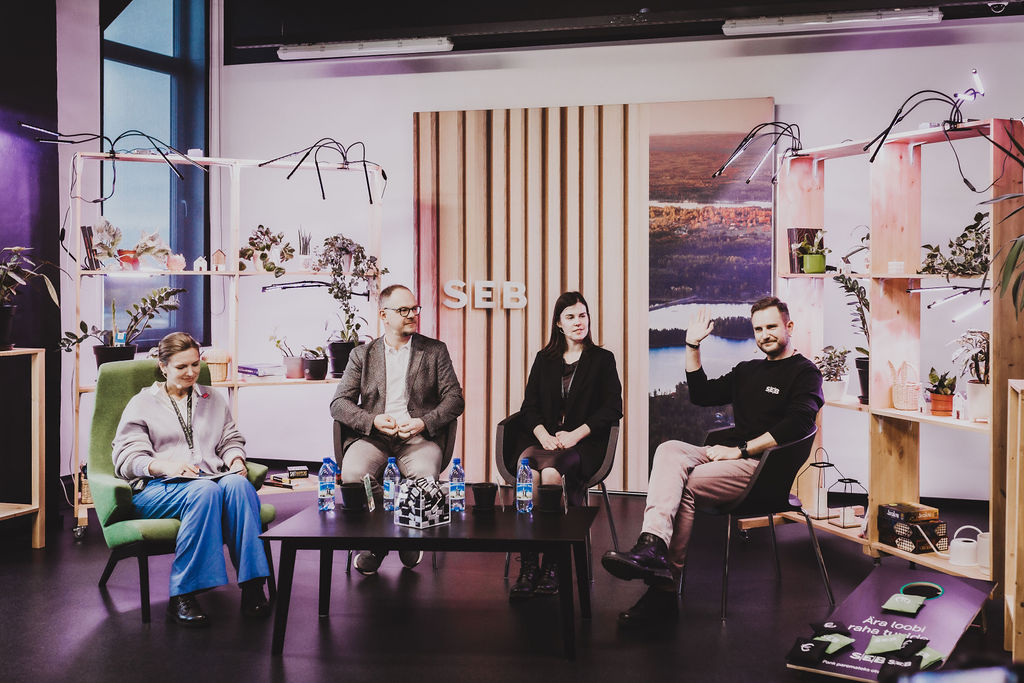The Future of Coding in the Age of AI – Insights from kood/Cast
19.02.2025
As artificial intelligence rapidly reshapes industries, one pressing question emerges: is coding still a valuable skill, or will AI take over software development altogether? In the latest episode of kood/Cast, we sat down with Rainer Sternfeld, co-founder of //kood, to explore the evolving role of programmers in the digital era. We also heard inspiring stories from Elena and Olha, two Ukrainian graduates of kood/Jõhvi, who turned uncertainty into opportunity and are now thriving in tech. Plus, we bring you key takeaways from the SEB Growth Corner panel, where industry experts discuss the importance of peer learning and collaboration in the modern workplace.
Why learn to code in the age of AI?
Many fear that AI will replace software engineers, but Rainer Sternfeld sees things differently. He compares AI in coding to calculators in mathematics – a powerful tool, but not a substitute for critical thinking and problem-solving. “AI can automate repetitive tasks, assist with debugging, and improve efficiency, but it won’t replace the need for skilled problem-solvers who understand how to design, build, and optimize systems,” he explains.
Instead of making coding obsolete, AI is making it more accessible. With tools like ChatGPT, even those with no prior experience can start experimenting with code, automating small tasks, and building solutions. However, true software engineering requires more than writing lines of code – it’s about structuring complex systems, working in teams, and understanding real-world applications. And this is exactly what //kood’s learning model prepares students for.
A journey from Ukraine to tech Careers in Estonia
For Elena and Olha, the decision to apply to kood/Jõhvi was life-changing. When war disrupted their studies in Ukraine, they took a leap of faith and joined //kood’s second batch, which welcomed 40 Ukrainian students.
“At first, it felt too good to be true – a free programme, scholarships, and even accommodation? My parents thought it was a scam!” Elena recalls. But what they found at kood/Jõhvi was a supportive environment where they could fully focus on learning.
Both women discovered unexpected strengths during their studies. For Elena, it was leadership and time management. “I never saw myself as someone who would take charge, but kood/Jõhvi pushed me out of my comfort zone. Now, at Pipedrive, I’m leading projects and using the skills I developed here every day,” she shares.
For Olha, the experience reaffirmed her passion for design and user experience. Today, she works on //kood’s own learning platform, shaping the future experience for new students. “The peer-to-peer learning model is so different from traditional education, but it mirrors the real work environment. It made the transition into a tech career much smoother,” she says.
Lessons from the SEB Growth Corner panel
Another highlight of the episode is a recap of the SEB Growth Corner panel discussion, where industry leaders, including Lauri Haav, Ede Tamkivi, Annika Tamm, and Sander Aasna, discussed the skills that truly matter in today’s job market.
One key takeaway? The ability to give and receive feedback. Coding is a collaborative effort, and learning how to navigate code reviews, discussions, and teamwork is just as important as mastering technical skills. “In a real work environment, your code will be picked apart by your team. The earlier you get used to constructive criticism, the faster you’ll grow,” noted one panelist.
Another important insight was the growing role of soft skills. Technical expertise is essential, but recruiters increasingly look for candidates who are proactive, communicative, and adaptable. Companies want developers who can think critically, collaborate effectively, and continuously learn.

The future is bright for those who embrace change
If this episode of kood/Cast has one key message, it’s this: coding isn’t just about writing software – it’s about problem-solving, adapting, and working with others to build something meaningful. AI will continue to evolve, but so will the role of software engineers. Those who embrace new tools, specialize, and develop strong communication skills will remain in high demand.
For anyone considering a career in tech, kood/Jõhvi offers a unique and effective path. Whether you’re looking to upskill, switch careers, or start fresh, the peer-learning model and hands-on approach provide an excellent foundation for the future.
Listen to the full episode on Spotify and YouTube!
Curious to join kood/Jõhvi? Learn more and apply: study.kood.tech